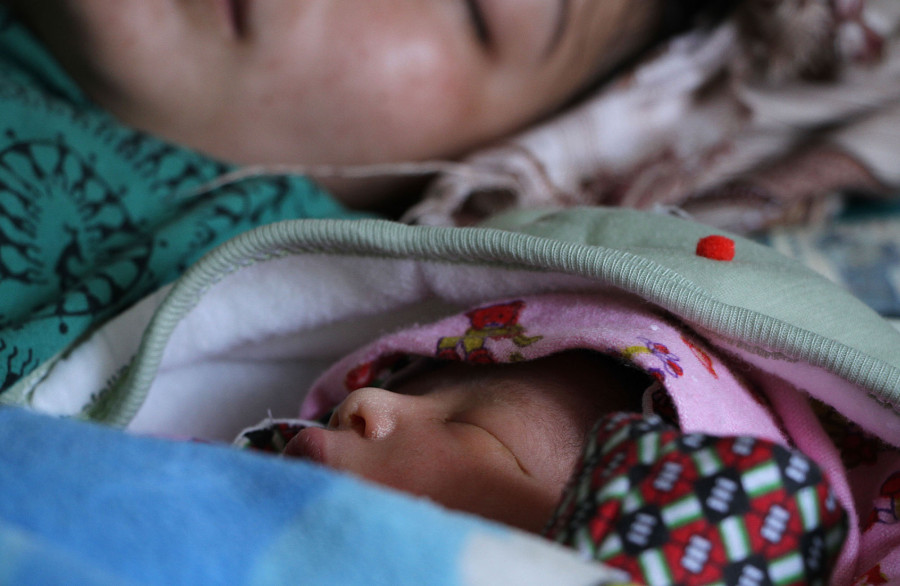Health
Pregnant and new mothers deprived of government-announced incentives
Thousands of women and their newborns are at risk as government-run health centres and hospitals across the country have stopped providing cash incentives for months due to lack of funds and coordination among government officials and ministries.
Arjun Paudel
Thousands of women and their newborns are at risk as government-run health centres and hospitals across the country have stopped providing cash incentives for months due to lack of funds and coordination among government officials and ministries.
On Monday, 24-year-0ld Laxmi Tamrakar from Kanchanpur gave birth to a baby boy at Seti Zonal Hospital. But when her husband, Krishna, contacted the hospital administration for travel allowance, he was provided the hospital’s contact number and asked to keep in touch.
“I am told that they will give us the money once the central government releases the budget,” said Krishna, who added that the ride back home in an auto rickshaw would cost Rs1,000.
Twenty-year-old Krishnaa Chaudhary of Kanaiyapur, Kailali district, also gave birth to a baby girl on Monday at the same hospital. Her sister-in-law who accompanied Chaudhary to the hospital said they would have to take a public bus to return home as they did not have enough money for an ambulance.
“I would not have come to the hospital if I had known that they were not going to give us the travel allowance,” the young mother said.
While the government’s ‘Safe Motherhood Programme’—under which mothers and babies are provided free medical costs, transportation allowance and cash incentives for antenatal checkups—has been instrumental in bringing women to health centres and hospitals and saving their lives, the lack of funds is putting the lives of thousands of women and their newborns at risk.
According to officials at the Family Welfare Division of Department of Health Services, the Safe Motherhood Programme is reeling under a financial crunch and an additional budget of Rs700 million is needed immediately.
“We are aware about the problems,” said the division’s director RP Biccha. “Provincial units have urged us to release the additional budget immediately to continue the programme. We alerted the Ministry of Health and Population two months ago.”
Last year, the government had doubled the amount of antenatal care and transportation cost provided for delivery in health institutions. “Maternity service will be provided from the stage of pregnancy to ensure nutrition of mother and child,” said Finance Minister Yubaraj Khatiwada, while presenting the budget in May last year.
As per the new budget, women in the mountainous, hilly and Tarai regions should get Rs3,000, Rs2,000 and Rs1,000 respectively. Additionally, cash bonus of Rs800 should be provided to mothers who complete all four antenatal checkups.
“Cash incentives distributed by health facilities were provided as per the budget speech. They have stopped because the additional budget as per the new declaration has not been released,” chief of Health Coordination Division at the Ministry of Health, Mahendra Prasad Shrestha, told the Post.
Death during childbirth because of a lack of access to medical services remains one of the leading cause of women’s death in Nepal.
According to the division, for every 1,000 births in Nepal, 229 women die during or after childbirth and the stats have not improved despite the availability of free services and allowances. The division’s data also show that only 57 percent of the pregnant women seek institutional delivery, and officials fear that the lack of funds, if not resolved at the earliest, could jeopardise all the gains the country has made in terms of international commitments to reduce and limit maternal mortality rate.
However, spokesperson at the Ministry of Finance, Uttar Kumar Khatri, said that the ministry would be releasing the additional budget to continue the Safe Motherhood Programme. “It is in the process. The ministry will take a positive decision,” he said.
Back at the Seti Zonal Hospital, dozens of women call the hospital administration every day, according to medical superintendent Dr Hem Raj Pandey.
“We don’t have the funds. Right now, we can do nothing but say sorry.”




 11.12°C Kathmandu
11.12°C Kathmandu















